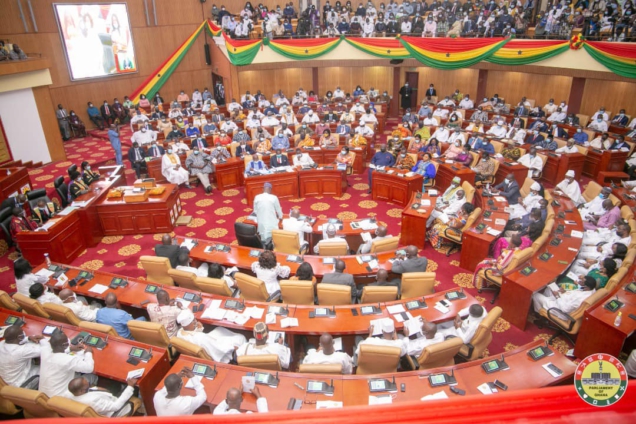The Director of the Institute of Local Government Service, Prof. Nicholas Awortwi, says when the law is amended to allow for the election of mayors at the local government level, it would significantly ease the pressure on Members of Parliament to bring development to their communities.
According to him, currently, MMDCEs that are appointed into office often go without a plan and indulge in little to no self-enterprising development projects in their districts.
This, he says has pushed MPs into difficult situations where they have to go beyond their mandated duties to ensure that developmental projects are executed in their constituencies.
Speaking on PM Express on JoyNews, Prof. Awortwi stated that when the law is amended to pave way for mayoral elections, MMDCEs would now be accountable to the electorates and this would push them to work assiduously to bring development to their communities.
“If you compare what is happening now to the Members of Parliament, you will see that Members of Parliament, although it is not their responsibility to provide the basic needs of the people at the local level – water, education, health and other things – they go beyond their duty to make sure that their constituencies get all of this.
“You wouldn’t see many unelected DCEs going beyond their core [mandate] to make sure that these are provided. Except when it’s coming from the centre and you realize that most of them depend on the common fund.
“On their own, there is little pressure or there is little sense of urgency. But if they’re elected, many of them will feel the same pressure that Members of Parliament feel. And that will even reduce the pressure on Members of Parliament,” he said.
He added that mayoral election would also boost participation in local government elections.
According to him, over the years the level of participation in local government elections have significantly dropped to the extent that in some areas, people do not avail themselves to be voted for in these elections.
This he says would become a thing of the past when mayoral elections are introduced.
“Then you will see also in terms of participation, currently if you compare the local level election participation by citizens to the national level you could see it’s about double. You’ll see the local government elections less than 40% of citizens turn up. In fact sometimes, there are some places you don’t get people to even apply to be elected. So these are some of the things,” he said.
Professor Awortwi also noted that while mayoral elections would somewhat abolish the winner-takes-all system that has become characteristic of Ghanaian politics, it would also do away with armchair politicking.
He said in the event where the mayoral elections are done based on partisan lines, all engaged political parties would have to show their capabilities in their various districts rather than the current system where parties in opposition merely criticize and do not actively participate in development.
“Then you’ll have the situation where the two political parties once they are in government and once they are in opposition, opposition always criticizes government for not doing enough. But once they participate at the real time, people will compare what they’re doing in their own small local government that they control, whether they’re doing something different.
“So for instance, you live in Accra, let’s say at Okaikoi, you know, NPP is in power, they control that municipality. The services that they deliver, if the NDC is in power, they’ll be comparing. Now they cannot sit and talk; armchair politicians are always criticizing.
“People, real time will question them in your won municipality where you control what have you done? Have you improved the situation? So there’s no armchair criticism from the opposition. So there are a number of advantages whether we elect them partisan or apolitical, there are advantages more than the one-party appointment of mayors we have now,” he said.
Latest Stories
-
‘Golden Boy’ Abdul Karim Razak honored at WAFU-B general assembly
4 mins -
Buipewura Jinapor secures Vice Presidential position in National House of Chiefs with record votes
13 mins -
2024 election: I want results to come out like ‘milk and honey’ – Toobu
14 mins -
Ghana’s Henry Bukari hands over chairmanship of ECOWAS Brown Card Council of Bureaux
20 mins -
Residents of Dome-Kwabenya on edge ahead of December elections
51 mins -
Moffy drops new single ‘Wo’, blending culture and modernity
1 hour -
Don’t bring soldiers to polling stations – Martin Kpebu
1 hour -
Ogyeahohuo Yaw Gyebi II retained as President of National House of Chiefs
2 hours -
Embrace ICT to fit in digital world – Ho NYA boss to youth
2 hours -
We don’t want armed soldiers at polling stations – Tanko-Computer
2 hours -
Drama as police corner armed robbers inside locked forex bureau at Lapaz
2 hours -
NEIP CEO to Kwaku Manu: You can support any political party, but stop misbehaving in NPP colours
3 hours -
30% quota for less privileged shows Free SHS is inclusive – Ofosu Nkansah
3 hours -
Nigerian-born conquers childhood hearing loss to become KNUST’s overall best graduating student
3 hours -
ECOWAS Court orders compensation for violations against New Force’s Shalimar Abbiusi
3 hours

